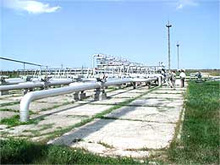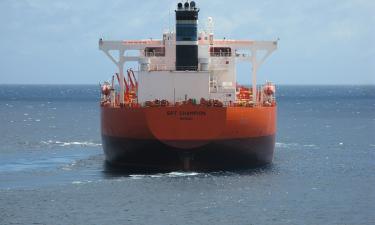Ukraine steals gas from Russia and sells it to the West
The Yushchenko team is holding Ukraine's population hostage for carrying out its audacious experiments
Russia and Ukraine is no longer in conflict over 7.8 billion cubic meters of natural gas that Ukraine “ripped off” from Russia, as Russian President Putin put it. Ukrainians will be paying for all the losses at a price that is close to the market one. Besides, Ukraine will have to buy gas from other suppliers to keep its economy running. The sale price will be mostly on an arm's length basis too. 
Paying the price for their own mistakes seems to be something unfair and inappropriate to the new Ukrainian authorities. Therefore, the Ukrainian consumer will have to pay. A hike in gas and electricity prices has been approved, the tariff change date to be announced sooner or later.
The plans of the Ukrainian government to increase gas and electricity prices came to light even before the latest gas dispute between Russia and Ukraine broke out. A similar controversy over natural gas arose between Tukmenistan and Ukraine shortly before it.
The story of the stolen gas
The gas problem became an item on the agenda of the bilateral relations way before the dispute arose over the Russian gas stored in Ukraine's gas underground storage tanks (USTs). It is Ukraine that set the ball in motion trying to revise the relations in the gas sector. Back in March this year, during the talks with Gazprom, Ukraine came up with a proposal by offering to switch from the barter terms of deal to cash payments for gas supplies and transit fees. As a result, Gazrom responded to the offer of the Ukrainian government and decided to make its own revision of the gas relations between the two countries. After all, transparency is transparency.
Late March Gazprom CEO Alexei Miller advised the Ukrainian President Viktor Yushchenko that the Russian gas reserves stored in the Ukrainian USTs might be used for increasing the amount of gas to be delivered to West European countries at the peak of consumer demand. At least such a possibility was considered by Gazpom. From last year's late October up to March this year the Russian side forwarded 40 requests to Ukraine as to gas in stock in the USFs. No answer came from Kiev. Apparently, Mr. Yushchenko did not see the issue worthy of his attention and therefore no instructions were given to clarify the situation. When the Russian side raised the issue yet another time in June, the Ukrainian side kept silence for a while. Then the Ukrainians began furnishing “conflicting testimonies.”
Within a few days they put forth several mutually exclusive versions of the situation while the Russians were already smelling a rat.
The main versions are as follows:
Natural gas is fully available yet can not be returned to Russia due to technical (technological) reasons. In other words, the full volume of Russian gas is in stock in the USTs but it can be pumped back to Russia only if squeezed out by additional gas. Therefore, Russia should supply new gas to Ukraine to squeeze out the old one. The above are the most plausible reasons often cited by the Ukrainian authorities.
The new authorities also put the blame on their predecessors. Blaming the has-beens is the most surefire version of the story for Kiev to stick to in terms of politics. But only unofficial sources cite it as an explanation while the official ones vaguely hint at the possibility of such a scenario. For example, energy company Naftogaz Ukrainy CEO Alexei Ivchenko made a statement on July 1st about gas that was allegedly in stock in Ukranian USTs. He also said that his company was pumping enough gas to the underground storage tanks. In the same statement he claimed that around 150 million of cubic meters of natural gas had been found in stock in the USTs when he had taken over the company. The figures are in contradiction to 8 billion bcm of gas reportedly signed for by the old management, said he. “As of today, we have practically resolved the problem and now we are pumping the gas storages with respective amount of gas,” said Mr. Ivchenko. He also said that a contract for the additional purchase of gas was in the works. He was confident the Ukrainians would be able to resolve the gas dispute with the Russians within a year citingthelatestsuccess of the Ukrainian government which managed to resolve the dispute with Turkmenistan over the gas sales to Ukraine, Podrobnosti reports citing Ukrainski Noviny.
The former head of Naftogaz Ukrainy Igor Boiko strongly objects to the above viewpoint, according to his yesterday's interview in the newspaper Zerkalo Nedeli.
Among other things, Mr. Boiko commented on the situation around the gas dispute with Turkmenistan. “The point is that no goods whatsoever have been set off as payment for Turkmen gas delivered to Ukraine since the start of the year, and no offset ratio has been agreed upon so far,” said Mr. Boiko. He claimed that Turkmenistan had officially warned Naftogas Ukrainy of a potential debt ranging from $400 million to $500 million that the Ukrainian side would run up should it fail to deliver goods for payment within three weeks, and the Turkmen side will consequently transfer the commodity sum of the debt into cash. Mr. Boiko said that when he was at the helm the company made every effort to pay back the Ukrainian debt incurred in the 1990s so that Turkmenistan might have no reason for blackmailing Naftogaz Ukrainy with the debt amassed. According to Mr. Boiko, the Turkmen side will definitely charge late payment fee and interest up to the complete debt redemption date should the debt agreement come into being. Mr. Boiko believes Turkmenistan will also demand a hike in price for natural gas it sells to Ukraine. On the level, the Ukrainians have no achievements to be proud of in this case. Perhaps Alexei Ivchenko has different evaluation criteria for failure and success.
Ukraine sold natural gas to the West at a European price. According to Dmitry Kulikov, expert of the State Duma Committee for Relations with Compatriots, Ukraine most probably used up the reserves of gas in the USTs to the max. He believes the remainder of gas formally labeled as the Russian stock can not be pumped out of the storage tanks without the risk of causing damage to normal operation of the storage facilities. In other words, Ukraine used up its own natural gas (it was sold and the money was wired to respective accounts) while maintaining the safety of its USTs with the help of Russian gas. Mr. Kulikov is confident that one of the re-export schemes can be clearly seen in Mr. Ivchenko's interviews. According to Mr. Kulikov, Mr. Ivchenko openly disclosed the business scheme used for Russian gas dealings. Mr. Ivchenko is opposed to the ban on gas re-export because it is the most viable part of the Naftagaz operations with profitability reaching up to 100% and above. It is a very smart move when you sell gas to Europe for 100% and pay back to Russia at a 50% basis some time later. That is the method used repeatedly by Ukraine when it took more Russian gas out of the pipeline than the contract stipulated. Subsequently, Ukraine produced debt agreements with a grace period based on a $50 price. In the meantime, Ukraine was selling gas to the West at a double price with immediate cash settlement.
Gazprom management opted to skip the bunch of “murky” patterns. Instead, Gazprom made a truly Solomonic decision and agreed to transfer the amount of reported gas to Nafrtogaz as part of Gazprom's 2005 transit fee payments regardless of actual availability of gas in the USTs.
Should the gas is really available in its storage tanks, Ukraine is free to use it for domestic consumers or sell it to Western Europe.
Kiev's reaction can indicate that even if the Russian gas was stored in full volume in the USTs some time ago, say six months ago, it can not be extracted anyway. Hence a breach of the contract. If a shortfall took place some time ago yet the reserves were replenished as of today, the gas in the USTs is still unavailable at the moment and can not be used even for domestic purposes. But the situation is of no concern to Gazprom, it is Ukraine's internal matter. Judging by the statement of the Ukrainian Prime Minister Yulia Tymoshenko made earlier this June, the gas can not be extracted from the storage facilities. She said that gas exports might be put on hold due to reported lack of gas for domestic needs amounting to 8 bcm in the year 2005.
In the same statement Mrs. Tymoshenko said that NaftagazUkrainyassuredthegovernmentthat contracts for the purchase of additional 8 bcm of gas would be signed until July 1st. The new contracts should enable the Ukrainian government to continue the gas export operations estimated at 5 bcm, reported Interfax-Ukraine at the end of June. As far as we know, no contracts were signed until July the 1st.
In light of the above developments, President Putin of Russia made a statement which the Ukrainians took as an insult. Speaking to the journalists, President Putin said: “We are planning to expand our cooperation with Ukrainians if they do not rip off our gas.” Mr. Putin also said that Russia intended to strengthen cooperation with Belarus and Poland with regard to the development of gas transit routes. “We are holding talks now with Norway, it has a good pipeline network which will be running out of gas in some ten years, Norway seems to be a very convenient partner to us for that matter,” added Mr. Putin. It is noteworthy that President Putin voiced his position on the issue only after the Ukrainians said that the Russian company's export operations could be at risk due to the decision on the setoff taken by Gazprom. In other words, Kiev hinted that it would take as much gas as needed from the pipeline network, and the remainder would make it to Europe. The Ukrainian authorities threatened to take action even though they just bluffed. Therefore, both the wording and the main point of President Putin's statement are quite adequate.
The one who foots the bill
The gas dispute between Russia and Ukraine came to an end last Sunday. The new Ukrainian authorities will be tackling all the problems related to natural gas that Gazprom said had gone missing.
Gazprom and Naftogaz Ukrainy said Sunday they had resolved a dispute over 7.8 billion of cubic meters of Russian natural gas stored in Ukrainian underground storage tanks. Part of the gas amounting to 2.55 bcm will be transferred to Naftagaz as part of Gazprom's transit fee payments. Gazprom agreed to sell the remaining amount to Rosukrnergo, a joint venture between Austria's Reiffeisen Investment and Russia's Gazprombank. Rosukrenergo is an operator of Turkmen gas supplies to Ukraine. According to the contract, Naftagas Ukrainy will supply gas to Rosukrenergo. And Gazprom will receive $800 million under the deal (around $150-$160 per 1,000 cubic meters).
Besides, Naftogaz will have to fill the gap at the domestic market. The Ukrainians cut a deal with a Russian independent trader ZAO Transnafta regarding the supply of 6 bcm. Rusukrenergo will supply Ukraine with another 5 bcm after receiving the “missing gas” from them.
The Ukrainian authorities will undoubtedly find a scapegoat to be held responsible for the shady dealings involving the Russian natural gas. The present management of Naftagaz is likely to take some heat. However, the “team of honest professionals” will get away with the monkey business. It is the Ukrainian economy that will have to pay the full price. Metallurgy and chemical industry, consumers of public utilities i.e. all Ukrainians will have to pay the price.
No matter how complicated and unclear the settlement patterns were under the “old regime,” all of them boil down to soft payment terms applicable to Ukraine. The transit fee payments across Ukraine and the price of Russian natural gas made no difference since Gazprom used a non-cash payment system. Increasing nominal price for the Gazprom gas by three times can be compensated by a 4-5 time hike in transit fees to reach the previous amount. For every action there is an equal and opposite reaction. So Russia would have the right to charge Turkmenistan the same transit fees for pumping Turkmen gas though the Russian pipelines to Ukraine as the latter does with regard to the Gazprom gas flowing to the West though the Ukrainian pipelines. And why should not Turkmenbashi increase his natural gas prices up to East European level? The price of gas both for the industrial companies and public utilities will rise in any case. Taking into the account the above, we would say that the Yushchenko team is holding Ukraine's population hostage for carrying out its audacious experiments.
Alexei Kovalev
Subscribe to Pravda.Ru Telegram channel, Facebook, RSS!





